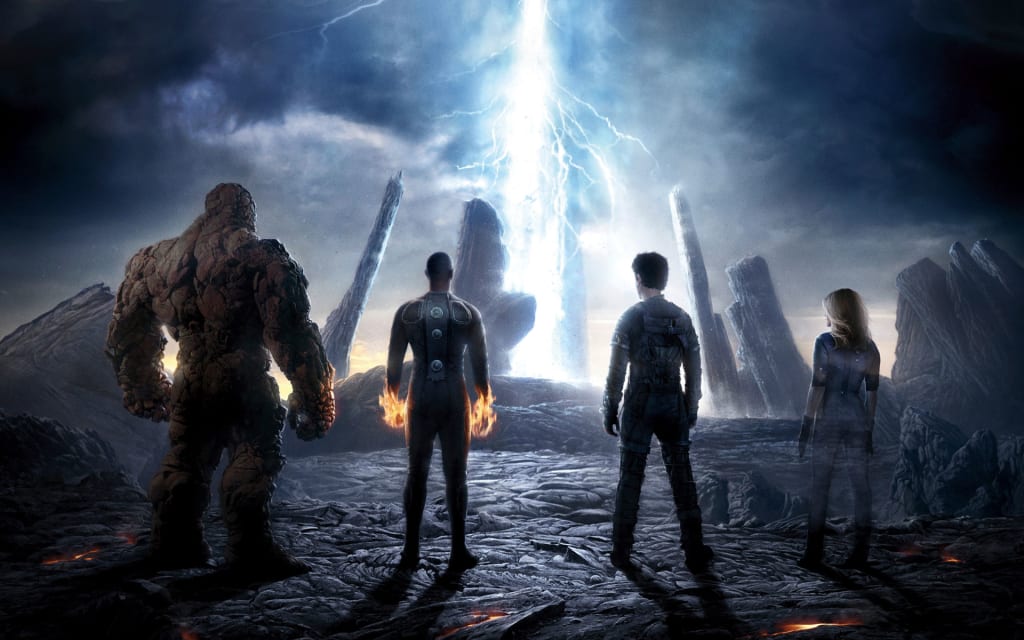Worst Superhero Movie Flops
While some superhero movies take glorious flight, others flop miserably in the box office.

From The Avengers to The Dark Knight to Captain America: Civil War, most superhero movies of the 21st century gave both fans and critics plenty of action and excitement. Unfortunately, not every superhero receives the best directors, writers, actors, and production value to lead to a worthy performance in the box office. The 21st century may have ushered in an era of over saturation for superhero movies, but that doesn't mean they were all good. Here’s a list of the worst superhero movie flops.
You could argue that this franchise is cursed, as none of its various iterations have ever been endorsed by critics or fans. Nevertheless, it would appear that Fox had the idea to reboot the failed series and cash in on the increased enthusiasm for superhero movies. Unfortunately, Fox should stick to TV, as this film opened to an underwhelming $25 million. Domestically, the film bottomed out at $56 million. If $25 million seems a like a lot, you should know that the estimated budget for the film was $120 million. Foreign sales may have saved this move from being a total wash, but it’s clear that the next studio who tries to make the franchise will be potentially exposing themselves to the curse that has bogged this franchise down since the 2004 version.
If the jokes in 2016’s Deadpool weren’t enough evidence of the horror that was Warner Brother’s Green Lantern, the minuscule estimated profit of $19 million should do the trick. Though the film opened to a decent $53 million, the film experienced an immediate tank after opening weekend and continued to plummet in the US. International audiences were a bit more willing to shell out money, but given the abysmal reviews, it’s not surprising that director Martin Campbell had trouble finding another job after this one. To be fair, that could be for many different reasons, but you don’t see Ryan Reynolds short of any acting options.
Admittedly, the judge is out for Spider-Man 3 because if you look hard enough, there are at least several critics who thought the film was decent. Fans, however, easily saw this film as a long and painful death to a pretty popular franchise. Or as the late and great Roger Ebert said about the film “Too many villains, too many pale plot strands, too many romantic misunderstandings, too many conversations, too many street crowds looking high into the air and shouting 'oooh!' this way, then swiveling and shouting 'aaah!' that way.” It’s just as well—despite how much people seem to hate this movie, it came away with $890 million worldwide so at least Sony had something to invest in later endeavors.
To the credit of those responsible for casting, Halle Berry was an excellent choice. Unfortunately, they neglected to put the same effort into the script, the production value, and the director. Pitof, by the way, has never directed another feature after Catwoman and thankfully turned his eyes to his true talent in visual effects. The truly sad result of this film however is that we were forced to suffer over 10 years of no female led superhero films. Also, given the estimated cost of making Catwoman, Warner Bros. suffered a major loss here.
Perhaps many female comic book fans had crossed their fingers in desperation that Elektra would fare better than Catwoman. It was more of the same unfortunately, with Jennifer Garner doing a great job but suffering because of the terrible script and sub-par directing. In fact, you could say that director Rob Bowman felt scarred for life because he went to TV and never worked on anything related to superheroes ever again. As far as monetary losses are concerned, Elektra made a small profit. It doesn’t really matter when compared to the damage that this film (and Catwoman) did to Hollywood confidence in female-lead superhero films.
In some ways, you can blame the failure of Elektra on Daredevil. If not for this film using her as a plot device, Fox executives may have never gotten the idea to try to continue the momentum. Largely confusing and somewhat silly, this version of Daredevil did make a solid box office presence (largely because powerhouse Marvel films were scarce at this time) with $179 million worldwide. Considering the $78 million budget, that’s a huge profit. But no film or comic book fan would ever call this film good. It’s mostly like Keith Phipps of AV Club said in his original review: “There's good stuff in the margins. But on the heels of such successful comic book adaptations as X-Men and Spider-Man, Johnson's film makes Daredevil look like the second-rate hero he never really was.”
To be fair, The Incredible Hulk was liked by a substantial amount of critics. However, you might call that a situation of low expectations. Nevertheless, the film made a solid profit with $263 million in the worldwide box office. Additionally, no one seemed to mind Edward Norton as the infamous Bruce Banner/Hulk character. The actual problem with The Incredible Hulk was the overemphasis on Hulk smashing, and the Marvel formula that seemingly necessitates connections to future installments. Or, as Roger Ebert explained in his review, “It sidesteps the intriguing aspects of Hulkdom and spends way too much time in, dare I say, noisy and mindless action sequences.”
Finding a balance between action and internal drama appears to be something that only comic book renditions of the Hulk have figured out. While 2008’s The Incredible Hulk was criticized for its emphasis on action, Ang Lee’s Hulk was criticized for talking too much and attempting too much dramatic depth. It’s just as well, Ang Lee went on to achieve much better things outside of the superhero spectacle, suggesting his talents were somewhat wasted here. Meanwhile, it would appear that Universal’s avoidance of superhero films since this film is likely attributable to the lack of excitement about Hulk. It’s just as well—many people didn’t like Eric Bana as the Bruce Banner/The Hulk anyway.
If there was a superhero that has received the absolute worst treatment cinematically relative to attempts, it would without a doubt be Superman. In all fairness, Superman Returns did manage to snag a certified fresh rating on Rotten Tomatoes and grabbed close to $400 million in the worldwide box office. So then why is it on this list? It’s because that certified fresh rating is only because more than half of the people that rated it, liked it. In hindsight, Superman Returns is only a flop once you realize that it only benefits in esteem relative to being surrounded by the awfulness of other superhero movies preceding it. That is to say, expectations were so low at that point that Superman Returns pleased audiences only from its ability to play it safe.
Some superheroes don’t belong on the big screen. This is precisely the case with Jonah Hex, which was already bound to suffer due to the general lack of popularity of the comic it was based on. Nevertheless, Warner Bros (are you noticing a trend here?) tried it and suffered an estimated $20 million loss for it. The critics hated it, and then because no one in the world had any idea who the cast (no shade Josh Brolin) or the characters were, the film couldn’t make up for it in the international box office, either. It’s almost as if there was a scramble in 2010 to find a less popular comic book series to draw an audience from (i.e. Guardians of the Galaxy), but the film was just too bad to ever have a chance of doing so.
Unless you’re over thirty or really into comics turned movies, there’s a good chance you have never heard of this one. No worries, you’re definitely not missing anything worth watching. It was the year 1997, in which the technology to make a suit reminiscent of Iron Man wasn’t available. As a result, you’re left with terrible acting, a large suspension of disbelief for a superhero who relies on a super-powered suit to be relevant in the world of Superman, and a director whose next project was Disney’s Zenon: Girl of the 21st Century. While Disney’s made for TV movie collection warranted a lot of cult classics, if you were hoping for a DC version of Iron Man, you would be severely mistaken. Also, this was yet another loss for Warner Bros. with the film costing $16 million and only taking in $1.7 million in the box office.
Once upon a time Alec Baldwin was in a comic book movie and played a superhero named “The Shadow.” It’s as bad as you think it sounds. The film ultimately turned a decent profit with $48 million in the worldwide box office. However, as Owen Bleiberman of Entertainment Weekly stated, “The movie has all the coherence of a bad acid flashback.” On top of the bad writing, there is also an apparent fundamental issue with The Shadow being best served as a pulp novel character and less as a silver screen superhero to look up to. It appears that Universal had the right idea picking TV pulp director Russel Mulcahy and Spider-Man screenwriter David Koepp, but perhaps somewhere between the script and production, some capability was lost. After all, the two guys never worked together again, and both went on to do well in their respective fields.
It’s starting to feel like, other than Batman movies, Hollywood was just not ready for superhero films in the 1990s. In the case of The Phantom starring Billy Zane, Paramount managed to attract enough movie-goers to get $17 million in gross, but offered almost nothing worth watching in the movie beyond the standard entertainment value in any film following a hero character. Rather, as Peter Travers of Rolling Stone explained, “Expect this ghost of bad movies past to walk quickly to the back bins of Blockbuster, where it should be filed under a helpful heading, monotonous and juvenile.”
There’s a good chance that either you or someone you know enjoyed Mystery Men for the campy goodness. They have probably even devised their own drinking game to go with it. However, there’s also a good chance that Universal has put this film in the list of things you never mention at the annual company banquet. That’s because the film cost $68 million to make and then only returned $33 million in the worldwide box office. In fact, you could say that Universal was so upset by this film that director Kinka Usher went back to his old life of directing commercials. It could be a coincidence, but it depends on how much you believe in Hollywood blacklisting.
If you’re a film buff, you’ve probably noticed that Lionsgate is nowhere to be seen on this list. That’s because somewhere along the early 2000s, Lionsgate realized that all the money to be made was in niche markets like YA novels and Tyler Perry movies. However, once upon a time Lionsgate tried it with “Punisher: War Zone” and paid the price. The movie cost $35 million to make and wound up only making a measly $10 million in the worldwide box office. Luckily for Lionsgate, they were lucky enough to license “Twilight” and “The Hunger Games” franchises. However, it is likely that Marvel fans will never forgive the company for this. As Keith Phipps of AV Club asserts, “It's a joyless plunge into gunfire that doesn't even know how to draw blood.”
About the Creator
Stephen Hamilton
Definitive movie buff. Quickly realized that it was more financially prudent to write about film than trying to beg for millions of dollars to make his own.






Comments
There are no comments for this story
Be the first to respond and start the conversation.